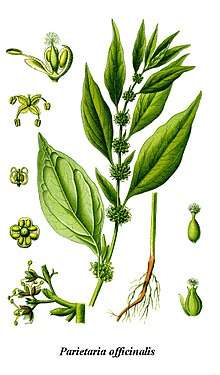Parietaria officinalis
Parietaria officinalis, the eastern pellitory-of-the-wall,[1] also known as upright pellitory[2] and lichwort, is a plant of the nettle family. Its leaves, however, are non-stinging. The plant grows on rubbish and on walls, hence the name.
| Parietaria officinalis | |
|---|---|
 | |
| Scientific classification | |
| Kingdom: | |
| (unranked): | |
| (unranked): | |
| (unranked): | |
| Order: | |
| Family: | |
| Genus: | |
| Species: | P. officinalis |
| Binomial name | |
| Parietaria officinalis | |
Uses
It was once used in the making of certain metheglins.
Chemistry
The leaves and flowers of P. officinalis contains the flavonoids kaempferol-3-bioside, the 3-glucosides and 3-rutinosides of quercetin, kaempferol and isorhamnetin, 3-sophorosides of quercetin and kaempferol and 3-neohesperosides of kaempferol and isorhamnetin.[4] They also contain caffeoylmalic and two pyrrole acids.[5]
gollark: That's not proof, you just posted some papers which are apparently related because vaguely relevant physics term you don't understand, yes.
gollark: Burden of proof.
gollark: Like I said, unless you actually make a coherent claim/set of claims and set out what exactly you think is the evidence for them, it's very hard to actually show you're "wrong".
gollark: "Moron" is kind of repetitive.
gollark: Although you *should* probably find some new terms for "idiot".
See also
It is in a different family from Anacyclus pyrethrum, also called pellitory.
References
- "BSBI List 2007". Botanical Society of Britain and Ireland. Archived from the original (xls) on 2014-10-23. Retrieved 2014-10-17.
- "Parietaria officinalis". Natural Resources Conservation Service PLANTS Database. USDA. Retrieved 30 January 2016.
- Cvitanović S, Zekan L, Capkun V, Marusić M (1994). "Specific hyposensitization in patients allergic to Parietaria officinalis pollen allergen". J Investig Allergol Clin Immunol. 4 (6): 283–290. PMID 7735515.
- Budzianowki, J.; Skrzypczak, L.; Walkowiak, D. (1985). "Flavonoids of Parietaria officinalis". J. Nat. Prod. 48 (2): 336–7. doi:10.1021/np50038a033.
- Budzianowski, Jaromir (1990). "Caffeoylmalic and two pyrrole acids from Parietaria officinalis". Phytochemistry. 29 (10): 3299–3301. doi:10.1016/0031-9422(90)80203-S.
- "w19 Wall pellitory (officinalis), Allergy information". Phadia AB. 2002. Archived from the original on 2006-05-23. Retrieved 2006-07-08.
This article is issued from Wikipedia. The text is licensed under Creative Commons - Attribution - Sharealike. Additional terms may apply for the media files.